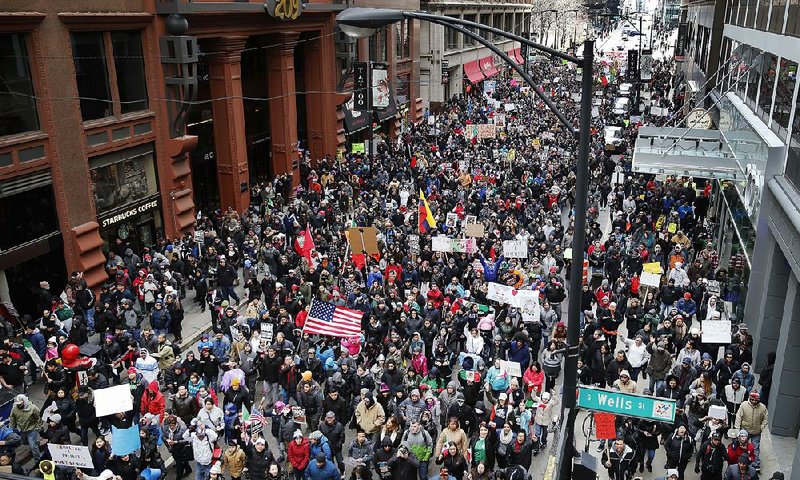PHILADELPHIA -- Immigrants across the U.S. stayed home from work and school Thursday to demonstrate their importance to the country's economy and many businesses closed in solidarity in a nationwide protest called A Day Without Immigrants.
RELATED ARTICLES
http://www.arkansas…">Trump condemns leaks http://www.arkansas…">New U.S. travel ban on the way http://www.arkansas…">Health care overhaul outlined http://www.arkansas…">Israel-envoy pick apologizes for insults, vows to changehttp://www.arkansas…">White House budget chief sworn in http://www.arkansas…">U.S. signals no shift on Russia http://www.arkansas…">U.N., Arab bloc: 2 states favored http://www.arkansas…">With FHA rate cut off, Trump's policy for housing blurry http://www.arkansas…">Northwest Arkansas students miss school, business close for A Day Without Immigrants
The boycott was aimed squarely at President Donald Trump's efforts to step up deportations, build a wall at the Mexican border and close the nation's doors to many travelers.
Organizers said they expected thousands of people to participate or otherwise show support.
"I fear every day whether I am going to make it back home. I don't know if my mom will make it home," said Hessel Duarte, a 17-year-old Honduras native who lives in Austin, Texas, with his family and skipped class at his high school to take part in one of several rallies held around the country.
[U.S. immigration: Data visualization of selectedimmigration statistics, U.S. border map]
Duarte said he arrived in the U.S. at age 5 to escape gang violence.
The protest reached into the U.S. Capitol, where a Senate coffee shop was among the eateries that were closed as employees did not show up at work.
Organizers appealed to immigrants from all walks of life to take part, but the effects were felt most strongly in the restaurant industry, which has long been a first step up the economic ladder for newcomers to the U.S. with its many jobs for cooks, dishwashers and servers.
Restaurant owners with immigrant roots of their own were among those acting in solidarity with workers.
[PRESIDENT TRUMP: Timeline, appointments, executive orders + guide to actions in first 100 days]
Expensive restaurants and fast-food joints alike closed, some perhaps because they had no choice, others because of what they said was sympathy for their immigrant employees.
Sushi bars, Brazilian steakhouses, Mexican eateries and Thai and Italian restaurants all turned away lunchtime customers.
"The really important dynamic to note is this is not antagonistic, employee-against-employer," said Janet Murguia, president of the Hispanic-rights group National Council of La Raza. "This is employers and workers standing together, not in conflict."
She added, "Businesses cannot function without immigrant workers today."
At a White House news conference held as the lunch-hour protests unfolded, Trump boasted of his border security measures and immigration arrests of hundreds of people in the past week, saying, "We are saving lives every single day."
Since the end of 2007, the number of foreign-born workers employed in the U.S. has climbed by nearly 3.1 million to 25.9 million, and they account for 56 percent of the increase in U.S. employment over that period, according to the Labor Department.
Roughly 12 million people are employed in the restaurant industry, and immigrants make up the majority -- up to 70 percent in places such as New York and Chicago, according to the Restaurant Opportunities Centers United, which works to improve working conditions. An estimated 1.3 million in the industry are illegal aliens, the group said.
Some people who skipped work will lose a day's pay or perhaps even their jobs. But organizers and participants argued that the cause was worth it.
Some schools and day care centers also were closed, with teachers reporting on social media about low attendance numbers.
"What a powerful message! My classroom is empty!" a middle-school teacher in Minnesota tweeted.
Marcela Ardaya-Vargas, who is from Bolivia and now lives in Falls Church, Va., pulled her son out of school to take him to a march in Washington.
"When he asked why he wasn't going to school, I told him because today he was going to learn about immigration," she said, adding, "Our job as citizens is to unite with our brothers and sisters."
Information for this article was contributed by Sophia Tareen, Juliet Linderman, David Saleh Rauf, Alex Brandon, Kevin McGill and Russell Contreras of The Associated Press and by Perry Stein of The Washington Post.
A Section on 02/17/2017
